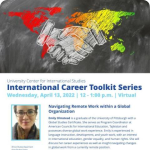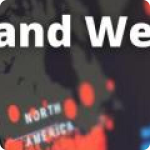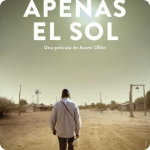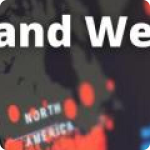Past Events

- Barbara Weinstein
Barbara Weinstein is the Silver Professor of History at New York University and Past President of the American Historical Association. Her publications include The Amazon Rubber Boom, 1850-1920 (1983), For Social Peace in Brazil: Industrialists and the Remaking of the Working Class in São Paulo (1996), and The Color of Modernity: São Paulo and the Making of Race and Nation in Brazil (2015). Her research has received support from the National Endowment for the Humanities, the John Simon Guggenheim Foundation, and the Radcliffe Institute for Advanced Study.

- Emily Olmstead
- Virtual Format - Zoom
Emily Olmstead is a graduate of the University of Pittsburgh with a Global Studies Certificate. She serves as Program Coordinator at American Councils for International Education, Tajikistan and possesses diverse global work experience. Emily is experienced in language instruction, development, and youth work, with an interest in international education, gender equality, and human rights. She will discuss her career experiences as well as insight navigating changes in global work from a currently remote position.
To Register:
https://pitt.zoom.us/meeting/register/tJUpf-Crqj4jHNfcF98DJhdvp2ihDYLi5W5F

- Dr. Cae Joseph-Masséna
Dr. Joseph-Masséna will present excerpts from her book manuscript Voicing Vodou: Haitian Women Writers and the Goddess Ezili. Her project highlights a previously unidentified literary genre created by three Haitian women writers which she calls “The Eziliphonic text. ”The term “eziliphonic” is a neologism which combines the name of feminine vodou deity “Ezili'' with the adjective “phonic,” referring to “voice” or “speech sound.” The book centers Haitian Women writers as theorists by demonstrating how, within this collectively created literary genre, they effectively rehabilitate vodou culture through their textualization of the feminine deity Ezili, while also centering voice and sound, not vision, as a critical category of the vodou imaginary. There are many iterations of Ezili spirits or lwas in Haitian vodou, but the ones studied here are Ezili Freda, the flirtatious mulatta and lover of all things beautiful, and Ezili Danto, the passionate dark-skinned single mother and fierce defender of her children. Each chapter draws on an interdisciplinary framework, grounded in Black feminist theory, Voice Studies, literary criticism, and Vodou Studies in order to show how Haitian women novelists mobilize Ezili’s vocal, or phonic, specificities in their narratives. In preparation for the session, students will get acquainted with Jacques Stéphen Alexis’ Réalisme merveilleux or Frankétienne’s Spiralisme. Then, they will read passages from Omise'eke Natasha Tinsley’s Ezili's Mirrors (2018) and Christina Elizabeth Sharpe’s In the Wake: On Blackness and Being (2016). They will also listen to a selection of jazz music. Dr. Cae Joseph-Masséna is an Assistant Professor of Comparative, Cultural and Francophone studies in the department of Modern Literature & Languages at the University of Miami. Her recent work focuses on contemporary Haitian women writers. A trained Jazz Vocalist and Berklee College of Music alumnus, her research focuses more broadly on the entanglement of voice, music, ritual and sound in Black women’s literary texts. Her research areas include comparative approaches to African diasporic literatures of the francophone Atlantic with an emphasis on Sound/Voice Studies, Haitian Studies and feminist queer of color critique.

- Posvar Hall/Zoom
The Center for Latin American Studies (CLAS) as part of the University Center for International Studies (UCIS) at the University of Pittsburgh welcomes faculty and students to the Latin American Social and Public Policy Conference. For 25 years we have welcomed researchers from around the world to Pittsburgh, creating spaces where the scientific community can discuss the past, present, and future of Latin America, Caribbean, and its Diasporas. Though this is always important, it seems even more crucial these days. LASPP conference participants, authors and presenters will benefit from CLAS' extensive international network and in-house scholars, to collect insightful feedback benefitting from top researchers in Latin American Studies. As a way to lower barriers for scientific exchange, papers may be presented in English, Spanish, and/or Portuguese

- Posvar Hall/Zoom
The Center for Latin American Studies (CLAS) as part of the University Center for International Studies (UCIS) at the University of Pittsburgh welcomes faculty and students to the Latin American Social and Public Policy Conference. For 25 years we have welcomed researchers from around the world to Pittsburgh, creating spaces where the scientific community can discuss the past, present, and future of Latin America, Caribbean, and its Diasporas. Though this is always important, it seems even more crucial these days. LASPP conference participants, authors and presenters will benefit from CLAS' extensive international network and in-house scholars, to collect insightful feedback benefitting from top researchers in Latin American Studies. As a way to lower barriers for scientific exchange, papers may be presented in English, Spanish, and/or Portuguese

- Posvar Hall/Zoom
The Center for Latin American Studies (CLAS) as part of the University Center for International Studies (UCIS) at the University of Pittsburgh welcomes faculty and students to the Latin American Social and Public Policy Conference. For 25 years we have welcomed researchers from around the world to Pittsburgh, creating spaces where the scientific community can discuss the past, present, and future of Latin America, Caribbean, and its Diasporas. Though this is always important, it seems even more crucial these days. LASPP conference participants, authors and presenters will benefit from CLAS' extensive international network and in-house scholars, to collect insightful feedback benefitting from top researchers in Latin American Studies. As a way to lower barriers for scientific exchange, papers may be presented in English, Spanish, and/or Portuguese

- Posvar Hall/Zoom
The Center for Latin American Studies (CLAS) as part of the University Center for International Studies (UCIS) at the University of Pittsburgh welcomes faculty and students to the Latin American Social and Public Policy Conference. For 25 years we have welcomed researchers from around the world to Pittsburgh, creating spaces where the scientific community can discuss the past, present, and future of Latin America, Caribbean, and its Diasporas. Though this is always important, it seems even more crucial these days. LASPP conference participants, authors and presenters will benefit from CLAS' extensive international network and in-house scholars, to collect insightful feedback benefitting from top researchers in Latin American Studies. As a way to lower barriers for scientific exchange, papers may be presented in English, Spanish, and/or Portuguese

- Julio Premat
- Cathedral 501
This talk focuses on three imaginary writers invented by Borges: Pierre Menard, Herbert Quain and Mir Bahadur Alí, on how the invention of these authors, and the imagining of their literary production, as a way for Borges to invent himself as a new kind of writer in the 1940s, and to reimagine literary history.

- Zoom
Technology and Data
Whether it be the development of a new app, advocating for new health care policies, creating accessible transportation, or building defense systems, all major projects require a form of data collection and interpretation. The collection and analyzation of data plays an ever-increasing critical role in our society. Speakers, including several alums from the social sciences, will share their career path to the fields of technology and data.
Conversation with Pitt REEES and Slavic Department alumni Drs. Elise Thorsen and Beach Gray, who work for Nvetta, a data analysis, consulting, and international cybersecurity firm.

- Caitlin Thistle
- Zoom
This area refers to how globalization affects people’s susceptibility to physical and mental illnesses, their access to appropriate kinds of care, and their general well being within the context of their community. Speakers include dedicated professionals within the fields of global health, public health, medicine, policy and advocacy. Caitlin Thistle, Senior Advisor for South Africa, Bureau for Global Health, U.S. Agency for International Development (USAID) will discuss her 10+ years of experience in global global health, family planning program design/analysis, multi-million-dollar program and project management, and knowledge management. Caitlin has worked and partnered with a number of organizations including USAID, FP2020/30, WHO/IBP, the Institute of Reproductive Health, JHU/Center for Communication Programs, and Pathfinder International. Caitlin holds a master’s degree in International Development from the University of Pittsburgh and bachelors’ degrees from Susquehanna University.

- Frick 125 (Auditorium)
Paraguay, 2020 | Documentary Mateo Sobode Chiqueno's Ayoreo ancestors worshipped the sun, which they saw as a superior and generous being. But for him and his generation, the sun has primarily become a threat, turning deforested areas into dry, dusty plains—filmed here beautifully but ominously. Some Ayoreo still live in seclusion in the forests of the Chaco in Paraguay. But many more, among them Sobode Chiqueno, were herded into isolated settlements by missionaries, who took their land and forcibly converted them to Christianity. He started recording Ayoreo conversations, stories, and songs in the 1970s, and is still traveling to Ayoreo communities with his now-antique cassette recorder to interview them and collect their voices for his audio archive. Occasionally the device eats a tape, which he fixes with patient fiddling. The conversations express uncertainty about the loss of identity. Is it a problem that a culture disappears in order to adapt to another?

- Zane Kaleem and Jordan Freeman
- Zoom
This area refers to how globalization affects people’s susceptibility to physical and mental illnesses, their access to appropriate kinds of care, and their general well being within the context of their community. Speakers include dedicated professionals within the fields of global health, public health, medicine, policy and advocacy. Zane Kaleem'17 and Jordan Freeman'13 will discuss their work in advocacy and securing health care access to incarcerated men and women. Zane is a current medical student at Drexel University College of Medicine pursuing residency training in psychiatry. As Assistant Director of the Correctional Healthcare Task Force at PfCJR, Zane develops organizational strategy, cultivates collaborations with other advocacy groups, and educates the public about issues in correctional healthcare through means including writing commentary pieces for local and national news media. Jordan currently works as a Program Manager with The Fortune Society, a Non Profit Organization serving individuals who've had contact with the criminal legal system. In her role, she monitors progress toward contracted deliverables, creates performance and quality assurance monitoring tools, conducts analysis and evaluation, and helps to create program workflows for Fortune's health-focused services. She has a Master's in Public Health, and holds special interest in healthcare's role in community re-entry, desistance, and reduced recidivism.

- Youssef Abdelwahab, Onyinye (Gandhi) Chuks, Hannah Cohen
- Zoom
Sometimes the right job doesn't doesn't fit and you create your own international path. Join these alum who have forged their own ways or have created international businesses while still working their day jobs.
Meet our Alum:
Onyinye (Gandhi) Chuks: I'm Onyinye Gandhi Chuks, Founder and Managing Consultant at Blu-Pearl International, a rapidly growing international finance, investment, and immigration firm. As an entrepreneur, my strategy was to identify problems unique to international business and provide solutions for them. From our humble beginning as a small U.S. startup with one employee and no clients in March 2017, we have expanded our operations into two West African countries and currently have 16 employees servicing over 50 clients!
Hannah Cohen:
Hannah Berkeley Cohen spent her 20’s living and working in Havana, as a journalist and tour operator during normalization of relations between Cuba and the US. As Cuba’s economy tanked and tourism plummeted worldwide because of COVID, Cohen returned to her hometown of Columbus, Ohio and began renovating old homes. She has a bachelor’s degree in Philosophy from Pitt, and is a strong believer in faking it ‘til you make you make it.
Youssef Abdelwahab:
Youssef Abdelwahab ’11, ’13 MT, started his own e-commerce business, designing niche headwear in which he fuses African, African diasporic and Arab cultures to create unique products (instagram: aragaparel website: aragapparel.com). He also became a landlord in the Germantown neighborhood of Philadelphia and will open a café in the next few months (iA). He is currently in his 10th year as a high school Spanish teacher.

- Dr. João Paulo S. L. Viana, Professor of Political Science - Federal University of Rondonia, Brazil
- 4217 Posvar/Zoom

- Zoom
- ‹ previous
- 30 of 52
- next ›

